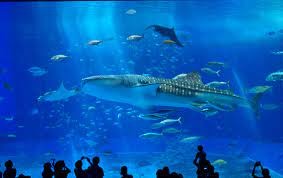Careers Information

Before you start applying for jobs, create a resume or ensure your current one is up to date. The Youth Central website has excellent resume and cover letter templates and tips on interviews, www.youthcentral.vic.gov.au

Summer Jobs
The holiday season is almost upon us and for young people that means Christmas casual jobs! Due to the increase in business, many organisations employ casuals to make up the shortfall in their staff. This is great news for young people as it’s the perfect time to apply for your first job, or even have a second one.

Workplace Spotlight
Aquariums
Aquariums serve as controlled environments designed to house and display a diverse array of aquatic organisms, including fish, plants, and invertebrates. Their primary purpose is to provide a platform for educational outreach, offering a unique opportunity to observe and learn about marine life in a controlled setting.
Beyond education, aquariums also play a crucial role in conservation efforts, functioning as hubs for research, breeding programs, and the preservation of endangered species. They also serve as recreational spaces for the public to enjoy.
While every aquarium is different, they do have some things in common:
- A passion for marine life – most roles are centred around the care and management of aquatic life.
- You’ll need strong communication skills – for interacting with colleagues and engaging with the public.
- Conservation efforts – many aquariums have a strong focus on preserving and protecting marine life.
Preserve and learn about marine life
Aquariums serve as vital educational and conservation hubs, offering a unique opportunity for the public to connect with and learn about marine life, fostering a deeper appreciation for our oceans and promoting environmental stewardship in society.
Key tasks
- Monitoring water quality
- Feeding and observing animal health
- Designing and maintaining habitats
- Running educational activities
- Participating in conservation efforts
- Conducting record-keeping and data analysis
- Presenting public presentations
- Researching marine life behaviour and biology
- Rehabilitate injured or distressed animals
- Implementing safety protocols and procedures
You can find aquariums in the arts and recreation services and agriculture, forestry, and fishing industries
There are lots of different types of aquariums, including public aquariums, research-focused aquariums, and private hobbyist aquariums, each serving distinct purposes in showcasing, studying, or enjoying aquatic life.
You can expect mixed hours and on-site work
Mixed hours | Work on-site | Jobs more common in metro areas | Strong job growth
Employees in an aquarium typically work a combination of regular and flexible hours, including weekends and holidays, due to the need for continuous care of aquatic life and to accommodate visitor demand.
On-site work is more common in aquariums as it requires hands-on care, maintenance of aquatic environments, and direct interaction with marine life. There may be some limited opportunities for remote work in certain administrative or research roles that involve tasks such as data analysis, planning, or educational program development.
Aquariums are more commonly found in metropolitan areas due to the higher population density and greater accessibility to a diverse audience.
How do we expect working in an aquarium to change in the future?
Working in an aquarium in the future will involve a blend of technological marvels, environmental stewardship, and inclusive education.
Technology is set to play a more prominent role. This might include sophisticated monitoring systems that keep tabs on the wellbeing of marine life in real time, and interactive displays that transport visitors even deeper into the heart of the aquatic world.
Sustainability is also becoming more important, from energy-efficient systems to eco-conscious exhibit designs. Aquariums are also going to be placing more emphasis on conservation efforts.
Aquariums will also strive to create environments that welcome and educate people from all walks of life, fostering a sense of unity and shared responsibility for the wellbeing of our planet.

Job Spotlight
Conservationist
Conservationists work to protect the environment, from protecting specific places and animals to changing behaviours and systems contributing to environmental damage. Employed in a wide range of roles and industries, Conservationists focus on preserving and saving life for future generations, benefitting the ecology and health of our planet.
If you are passionate, dedicated, and want to help make the world a better place, then working as a Conservationist could be ideal for you.
If you have these skills, you could make a great Conservationist
- Focused on finding solutions to problems and thinking outside of the box
- Practical, realistic, and down to earth
- Willing to get your hands dirty
- Committed to making a difference and creating change
- Can communicate effectively
- Able to commit to a cause or project long-term
- Positive and resilient
What tasks can I expect to do?
Conservationists can work in a number of diverse areas, so your job duties will depend on your specific role. Broadly speaking, there are four main areas of conservation:
- Environmental Conservation – In this field you could be preserving ecosystems, creating and maintaining national parks, researching sustainable solutions (such as alternative power and recycling schemes), or working to combat the effects of climate change and pollution.
- Animal Conservation – In this role you could be more focused on the protection of endangered species and their habitats. You could be researching and observing animal behaviour, working to combat the effects of humans and their activities, educating communities, identifying new threats, or working in wildlife rehabilitation.
- Marine Conservation – In this area you’d be helping to study, research, and protect the life within our oceans, seas, and the connecting waterways and coastal ecosystems. You could be working to protect marine life, reduce fishing impacts, combat water pollution, or study the effects of rising sea temperatures.
- Human Conservation – Working in this field you might be educating others, implementing sustainable and low environmental impact solutions and lifestyles, protecting cultures, customs and traditions, improving living standards, advocating for local communities, and more.
Where do Conservationists work?
You could be working in national parks, forests, fisheries, out in the ocean, in a lab, at museums and universities, for the government, in an office, or working directly in communities. Depending on your role, you might be able to work remotely. There is also a high chance that you’ll get to travel and work in a variety of different locations.
What kind of lifestyle can I expect as a Conservationist?
You may have to work outside of normal business hours and commit to long periods away from home. If you’re passionate and highly invested in your work, this might impact more on your lifestyle.
Most Conservationists can expect to earn an average salary throughout their career.
You don’t have to be a scientist in order to work as a conservationist; artists, managers, engineers, agriculturalists, journalists, or anyone else who makes a contribution to conservation can be called a Conservationist.
How to become a Conservationist
Conservation can be a highly competitive career to get into. For most jobs, you’ll usually need to have a qualification in a relevant field – but you might find work through other pathways too, such as volunteering and networking.
Step 1 – Finish high school. Subjects to focus on can include English, Maths, Sciences, Geography, or even Law. If you already know which area of Conservation you’d like to work in, you can tailor your subjects to suit.
Step 2 – Identify which area of conservation you’re most passionate about, then think about whether you’d like to work out in the field, in a lab, or in an office. This can help you select the best study pathway.
Step 3 – Complete relevant tertiary qualifications. You’ll learn specific knowledge and skills, and it can make you more competitive in the job market.
Step 4 – Volunteer work is a great way to gain understanding, meet people working in the field, and add experience to your resume. Find opportunities in your local community or consider travelling overseas as part of a larger project.
Step 5 – Apply for lots of jobs, be enthusiastic, and stay motivated.
Find out more here:
- Australian Conservation Foundation
- New Zealand Nature Fund
- The Conservation Foundation (UK)
- The Conservation Fund (US)
- International Conservation Fund of Canada
- Conservation International
Similar careers to Conservationist
- Park Ranger
- Field Guide
- Zookeeper
- Veterinarian
- Anthropologist
- Archaeologist
Career News
YEAR 12 STUDENTS
- Important tertiary reminders
- Early entry programs still open
- Scholarships closing soon
- Australian Catholic University – scholarships information webinar
- Alternative Schoolies
- Tertiary dates
- ADF Gap Year – applications still open
- Richmond Institute of Sport Leadership

For a full list of cancelled, amended and new courses visit VTAC
YEAR 9 STUDENTS
- Indigenous Australian Engineering School 2024
- Santos Science Experience – Agriculture program
YEAR 10 STUDENTS
- United World Colleges – applications now open
- Indigenous Australian Engineering School 2024
- Santos Science Experience – Agriculture program
- Monash University Peninsular Campus Experience Day
YEAR 11 STUDENTS
- University of Melbourne – VCE Summer School
- Indigenous Australian Engineering School 2024
- Monash University Peninsular Campus Experience Day
- Medicine and Dentistry UCAT webinar
ALL STUDENTS
- Exciting STEM Job Kits
- Music Careers Guide
- Victoria Police Careers Guide
- Careers working with people with eye disorders
- Summer jobs
- Train to become a flight attendant
- Study climate change
- Explore outdoor education and outdoor recreation courses
- Interested in forensic science courses?
- Summer schools
- Upcoming career events and programs.

Pharmacy and Pharmaceutical Science Courses in Victoria in 2023
The Good Universities Guide states that a Pharmacist supplies, dispenses and manufactures medicines, whilst, according to the Explore Health Careers website, a Pharmaceutical Scientist spends more time in the laboratory studying and discovering medicines.
Pharmacy and Pharmaceutical Science undergraduate degrees for school leavers offered in Victoria include:
| UNIVERSITY | COURSE | VCE PREREQUISITES | ATAR FOR 2023 |
| La Trobe University B – Bendigo Campus | Pharmacy (Honours) | Units 3 and 4: a study score of at least 30 in English (EAL) or at least 25 in English other than EAL; Units 3 and 4: a study score of at least 25 in Chemistry; Units 3 and 4: a study score of at least 25 in any Mathematics. | 82.65 (B) |
| Monash University P – Parkville Campus C – Clayton Campus | Pharmacy (Honours) | Units 3 and 4: a study score of at least 27 in English (EAL) or at least 25 in English other than EAL; Units 3 and 4: a study score of at least 25 in Chemistry; Units 3 and 4: a study score of at least 25 in one of Maths: Mathematical Methods or Maths: Specialist Mathematics. | 88.05 (P) |
| Pharmacy (Hons) and Master of Pharmacy | 88.10 (P) | ||
| Pharmacy (Hons) Scholars program/Master of Pharmacy | 98.00 (P) | ||
| Pharmaceutical Science | 83.20 (P) | ||
| Pharmaceutical Science Advanced (Honours) | 88.10 (P) | ||
| Pharmaceutical Science Advanced (Honours) – Scholars Program | 98.05 (P) | ||
| Chemical Engineering/ Pharmaceutical Science | 85.90 (C) | ||
| RMIT University B – Bundoora campus C/B – City/Bundoora | Pharmacy (Honours) | Units 3 and 4: a study score of at least 30 in English (EAL) or at least 25 in English other than EAL; Units 3 and 4: a study score of at least 25 in any Mathematics; Units 3 and 4: a study score of at least 25 in Chemistry. | 75.40 (B) |
| Pharmaceutical Sciences | Units 3 and 4: a study score of at least 30 in English (EAL) or at least 25 in English other than EAL; Units 3 and 4: a study score of at least 20 in one of any Mathematics or Physics; Units 3 and 4: a study score of at least 20 in Chemistry. | 70.60 (B) | |
| Chemical Engineering/ Pharmaceutical Science | Units 3 and 4: a study score of at least 30 in English (EAL) or at least 25 in English other than EAL; Units 3 and 4: a study score of at least 20 in one of Maths: Further Mathematics, Maths: Mathematical Methods or Maths: Specialist Mathematics; Units 3 and 4: a study score of at least 20 in Chemistry. | 83.25 (C/B) |
Log onto VTAC to find out more about these and other similar courses.
Note: Monash University has been ranked FIRST in the world for Pharmacy and Pharmacology followed by Harvard University in the QS 2022 World University Rankings by Subject list – QS World University Rankings for Pharmacy and Pharmacology 2022 | Top Universities.
Snapshot of Holmesglen Institute in 2023

- Holmesglen was formed in 1982 and has grown into a large TAFE provider.
- Holmesglen offers over 500 courses from seven campuses at six locations, including Chadstone, Moorabbin, Glen Waverley, and Eildon.
- Holmesglen has invested over $25 million the last few years in building world-class facilities at the Moorabbin Campus. These include four large teaching wards, microbiology, and bioscience laboratories, two simulation suites, a community apartment, an allied health laboratory, lecture theatres, general teaching spaces, a co-operative learning centre, computer laboratories and teaching and administrative staff offices. The facilities have state-of-the-art equipment, reflective of industry standards.
- In 2017, Healthscope opened Australia’s first TAFE-based hospital, the Holmesglen Private Hospital. The Holmesglen Private Hospital is located at the Holmesglen Institute’s Moorabbin campus and provides clinical practice as well as teaching and research for nursing and allied health students.
- The Learning Skills Centre at Holmesglen is there to help students with their studies. This includes academic referencing, assignment support, note taking, presentation skills, report writing, research skills, study skills, summarising skills, time management.
- Many of the Allied Health programs offered by Holmesglen are taught at the Moorabbin Campus. These include –
- Allied Health Courses
- Community Services Courses (including Disability, Mental Health, and Youth Work)
- Nursing Courses
- Pathology and Laboratory Testing Courses
- Students interested in studying Aged Care or Individual Support, are encouraged to browse the following link – Five tips to a Rewarding Career in Aged Care.
- Holmesglen partners with industry, which is a hallmark of what Holmesglen offers, and covers all areas of its teaching and learning disciplines. We ensure this connection extends to our learners through partnerships and placements that enable students to experience contemporary work practices and work in relevant and stimulating environments.
- Holmesglen offers both Free TAFE courses.
Laura Lunardi
Careers Coordinator


